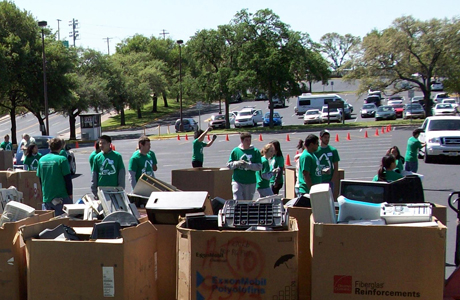This is the second e-waste drive hosted by the university’s Student Engineering Council. Last year the group coordinated 100 volunteers and collected more than 6,400 cubic feet of electronics from Austin-area citizens.
This effort preserves finite resources, and prevents health hazards which often occur as a result of improper electronic waste disposal. The groups hope to collect double the electronic waste collected last year.
 Last year the group coordinated 100 volunteers and collected more than 6,400 cubic feet of electronics from Austin-area citizens and plans to double that amount at the 2010 drive.
Last year the group coordinated 100 volunteers and collected more than 6,400 cubic feet of electronics from Austin-area citizens and plans to double that amount at the 2010 drive.- Event: Austin-wide electronics drive offering free electronics recycling to the community
- When: 9 a.m.-3 p.m. Saturday, April 17th
- Where: Collection point for electronic waste is at Lot 39 of the LBJ parking lot.
- Background: The Student Engineering Council, along with Goodwill Computer Works, will hold an Austin-wide electronic waste (e-waste) drive to collect unused and disposable electronics and electronic parts that cannot be disposed of through standard methods of waste collection and recycling. The general public is invited to drop off any personal electronics to the event and receive free recycling.
- Examples of acceptable items: Computers, fax machines, scanners, printers, copiers, DVD/VCR players, televisions, cables or wires, MP3 players and cell phones.
- Unacceptable items: Non-computer plastics, hazardous materials, iron-containing metals, paper or wood, refrigerators, other appliances.
Organizers estimate that about 160 volunteers will be involved in the event.
Participating engineering organizations will earn points based on the help they provide in preparation before and during the event. Other organizations will earn points based on their help during the event. Organizations with the most points will win cash prizes.
According to the U.S. Environmental Protection Agency, 82 percent or 1.8 million tons, of televisions, cell phones and computer products ready for end-of-life management are disposed of primarily in landfills. Computers, cameras and cell phones are filled with highly toxic materials, like lead, mercury, cadmium and brominated flame retardants.
The Student Engineering Council Web site provides additional information online for volunteers or contributors.







